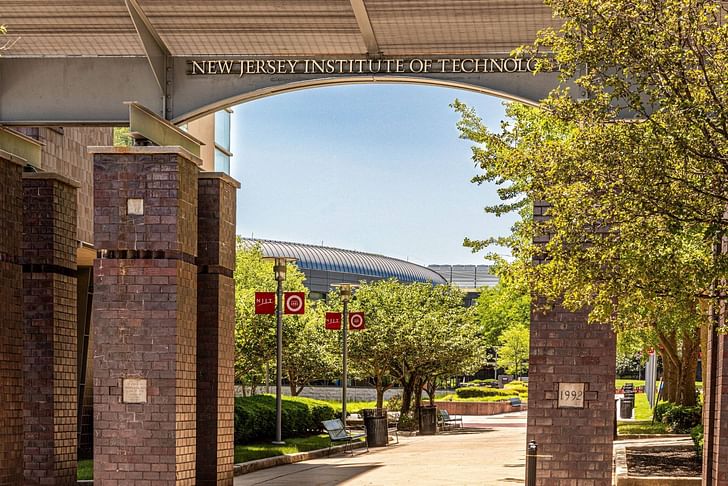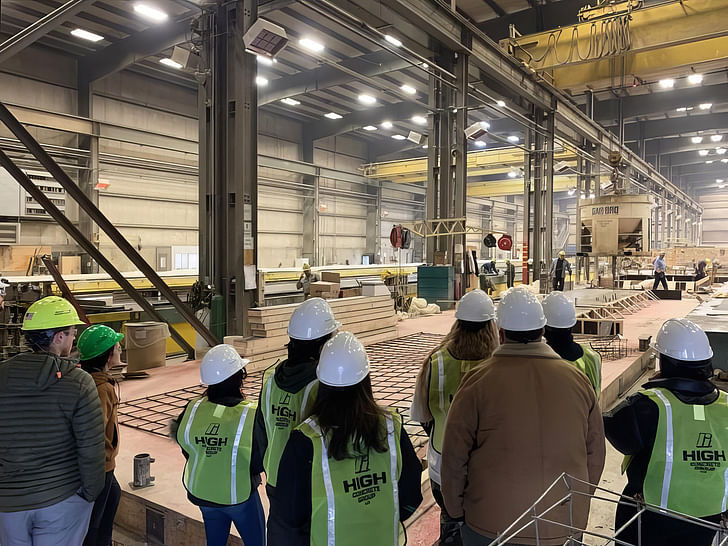

Implementing sustainability practices continues to be a priority among architecture firms, institutions, and organizations around the globe. This is the case for the New Jersey Institute of Technology's Hillier College of Architecture and Design. As one of the leading polytechnic universities in the Northeast for its academic programs, it has also earned global recognition as a top sustainable institution from the Times Higher Education's Impact Rankings.
Its efforts and commitment to being a sustainable campus continue beyond there. These initiatives are also echoed throughout Hillier College's pedagogy. In previously featured editorial coverage of the College, Archinect has had the chance to highlight important events that showcase the engagement and dedication to implementing sustainable design approaches, civic engagement, and climate action. For this unique editorial feature, we emphasize, in broad strokes, important topics explored at the College's research centers and labs, spotlight NJIT's sustainability leadership, and examine examples of studio work.
Hillier College is comprised of the New Jersey School of Architecture and the School of Art and Design. Situated in Newark, New Jersey, the College's engagement with its community and surrounding built environment can be seen through numerous research projects that address topics such as resilient design, building energy, material dynamics, and building dynamics, as well as exploring sustainable knowledge of the built environment.
“We cannot be sustainable unless we are also equitable. In Newark, racial inequality and environmental injustice are deeply intertwined. As educators of architects and designers, we must help our students to challenge the status quo, to examine the way that we use materials, to consider where we source materials, to understand and value labor. These are all connected to the big issues of climate change and sustainability and diversity, equity, and inclusion. If we don't bake these into every aspect of everything we do at Hillier College, then we are failing as educators,” Gabrielle Esperdy, Interim Dean of the Hillier College of Architecture and Design, explained.
The success of these research topics is matched by the powerhouse faculty and staff at NJIT. To better understand the College's academic approaches to teaching sustainability initiatives, we'll begin by diving into two research centers: the Center for Resilient Design and the Center for Building Knowledge (CBK).
The College's Center for Resilient Design has become one of the many vehicles for providing opportunities for students and faculty to engage in hands-on learning while promoting sustainable design practices and initiatives. In the wake of the aftermath brought by Hurricane Sandy, the Center was established in 2012 as a means to "serve as a resource to help New Jersey communities recover from the effects of Sandy – first as a special program within the Hillier College of Architecture and Design and then as a full-fledged center within the university." With an emphasis on exploring resilient design the Center has now become a hub for "improving the resilience of buildings and communities in the face of natural disasters and other stresses to inform and support disaster-resilience initiatives in other jurisdictions across the US and beyond."
Individuals such as Associate Dean for Research and Executive Director Deane Evans (FAIA) and Christine Liuakus (RA, CPHC), and Terra Meierdierck (MAT) offer leadership and guidance at the Center for Resilient Design to help carry out projects and research initiatives like Healthy Coastal Ecosystems: Historic Greenwich Township Project, the Breezy Point Resiliency Rebuild, and National Resilience Initiative to name a few. Providing hands-on learning experiences is an essential part of Hillier College's pedagogy. Architectural design studios like the Greenwich Township Studio, Hoboken Terminal Studio, and Resilient Design Studios offer students the ability to explore and address resilient design strategies through research, analysis, and developing innovative design solutions for New Jersey communities.
The Center for Building Knowledge is a longstanding institute within the College of Architecture and Design. For 30 years, the Center has offered research, training, and aid to help foster “new knowledge to improve the built environment and enhance the planning, design, construction, and operation of facilities.”
Under Evans, Luiakus, and Meirdireck, the Center has initiated programs like Microgrids for Resilient Communities Planning, the Asset Score Tool, Affordable Housing Design Advisor, and New Jersey Public Buildings Energy Efficiency Program (NJPBEEP) to name a few. Its mission, like the Center for Resilience, is to provide faculty, students, and the community with tools and resources to make "make better-informed decisions about the performance, sustainability, and resilience of buildings."
In addition to the College's dedicated faculty and administration, the school is one of the few academic institutions with leadership staff positions focused purely on sustainability. In February 2022, the school announced the appointment of its First Assistant Director for Sustainability, Prabhakar Shrestha, P.hD. With an extensive professional background in sustainability leadership, Dr. Shrestha comes to the College with knowledge of environmental conservation and sustainability. In a school profile by Rory Pasquariello, Dr. Shrestha explained, "We're establishing a norm here. If NJIT can do it, I can do it in my house and business, too. We're instilling values. When you're talking about community improvement, that takes everyone." Dr. Shrestha explained that "Everybody is looking for answers when it comes to addressing sustainability within academic institutions. Higher Education is one of those places people look to, so we have to lead. We have that trust, so we just have to deliver. The essence of these solutions is in students and faculty."
Everybody is looking for answers. Higher Education is one of those places people look to, so we have to lead. – Prabhakar Shrestha P.hD, NJIT's Assistant Director of Sustainability
In March 2022, Archinect saw just how committed the school's faculty and staff are to using various disciplines as examples for creating change and direction through their 2022 Environmental Life Cycle Assessment in Design Symposium (eLCAd) and the upcoming 2023 eLCAd symposium. We connected with John Cays (Associate Dean of Academic Affairs and eLCad symposium organizer), who emphasized the importance of building cross-disciplinary bridges to show how "firms and students can get in on the ground floor" when it comes to implementing sustainability practices like Life Cycle assessment, architecture, and design.
Dr. Shrestha, Cays, and Evans are only a small selection of dedicated faculty and practitioners who continuously provide support and collaboration at NJIT/Hillier College. It's to be noted that Evans was recently awarded the Upjohn Research Grant in early March for his work in "renewable and distributed energy sources, the management of electricity across systems, and the potential of managing Grid-Interactive Efficient Buildings to continuously optimize distributed energy resources."

Another example of “real life” sustainable design applications is the Newark Design Collaborative led by Professors Anthony Schuman, Darius Sollohub, Georgeen Theodore, and several other design faculty within Hillier College and the University itself. Sollohub, the Executive Director of the Collaborative and Interim Director of the NJ School of Architecture, described its work “as inherently sustainable and equitable, preserving and maintaining elements of Newark by merging the interests of communities, the academy, and students.” In December 2021, Archinect had a chance to sit in the Fall 2021 Super Review Showcase, where work from the Master of Urban Design Studio and Bachelor of Architecture Option Studios were highlighted.
When it comes to sustainable design approaches and best practices, NJIT and Hillier College of Architecture and Design are committed to "doing the work." Starting within the University's administration to the faculty and staff, sustainability efforts reverberate through the school's culture and academic programming.
NJIT Hillier College of Architecture and Design offers a Bachelor of Architecture and Bachelor of Science in Architecture degree as well as three Masters programs (Master of Architecture, Master of Science in Architecture, and Master of Urban Design) as well as four graduate certificates. A Ph.D. program in Urban Systems is also offered by the College. To learn more about NJIT Hillier College of Architecture and Design and its program offerings, click here.
Katherine is an LA-based writer and editor. She was Archinect's former Editorial Manager and Advertising Manager from 2018 – January 2024. During her time at Archinect, she's conducted and written 100+ interviews and specialty features with architects, designers, academics, and industry ...
No Comments
Block this user
Are you sure you want to block this user and hide all related comments throughout the site?
Archinect
This is your first comment on Archinect. Your comment will be visible once approved.